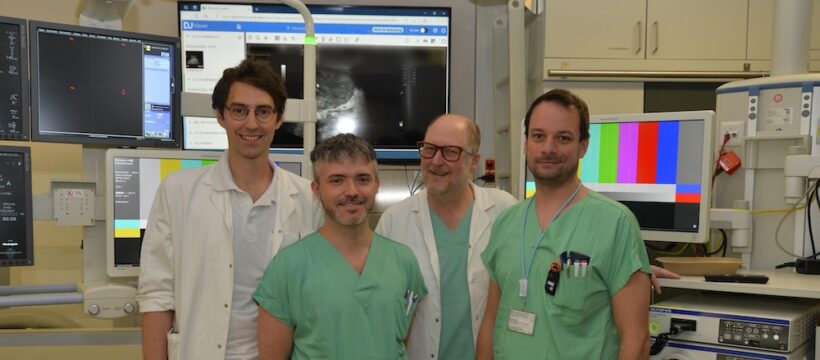A study by Karl Landsteiner University of Health Sciences shows: With AI support, even junior doctors can already make accurate decisions during colorectal cancer screening.
Krems, Austria, 24. June 2025 – Young doctors can distinguish between harmless and dangerous colon polyps during a colonoscopy just as reliably as experienced specialists – provided they are assisted by artificial intelligence (AI). This is the finding of a medical study from Lower Austria. The study examined the quality of the „optical diagnosis“ made by endoscopy trainees when supported by the GI Genius® AI system. The results were striking: junior doctors achieved diagnostic accuracy comparable to their experienced colleagues. The study, which has been published internationally, was conducted by the University Hospital St. Pölten, a teaching and research centre of the Karl Landsteiner University of Health Sciences (KL Krems). These results could make colorectal cancer screening safer, more efficient, and more cost-effective – while also enhancing medical training.
Colorectal cancer is one of the most common types of cancer in Europe, but timely screening can be highly effective in preventing it. Colonoscopy is considered the gold standard for this purpose. It enables potentially dangerous colon polyps to be detected and removed at an early stage. However, accurately distinguishing between benign and potentially malignant polyps requires significant expertise. This type of assessment is known as „optical diagnosis“. Until now, only internists with years of experience have been able to make such assessments with confidence. The new study aims to pave the way for less experienced physicians to make equivalent assessments. The study was conducted at the Divsion of Internal Medicine 2 at St. Pölten University Hospital (a teaching and research centre of KL Krems) under the direction of Prim. PD Dr. Andreas Maieron.
AI as Ally
„We asked: Can artificial intelligence help junior doctors work faster and with greater confidence? The answer is a resounding ‘yes’,” says study leader Dr. Andreas Maieron. The gastroenterology and hepatology specialist emphasises: „This is a rare real win-win situation – for training and for those affected.“ The GI Genius® system analyses the images recorded during colonoscopy in real time, providing guidance on assessing the type of polyp.
A total of 225 people were examined as part of the prospective study. The examinations were carried out by junior doctors, who were supported by the AI system. These assessments were then compared with the histological findings of the removed polyps and with evaluations by experienced physicians working without AI support. The outcome was that, in cases involving small rectal polyps (≤5 mm), junior doctors correctly classified a polyp as harmless over 90% of the time – achieving the same level of accuracy as experienced experts. The AI system alone also achieved an excellent result of over 93%.
Optimised Preventive Care
In practical terms, AI-assisted colonoscopies can enable less experienced physicians to provide safe and high-quality preventive care. Under certain conditions, harmless-looking polyps do not need to be removed, reducing risk, saving time, and cutting costs. This makes preventive care more efficient and potentially more accessible. For patients, this means greater safety, fewer unnecessary procedures and even more effective long-term protection against colorectal cancer.
The research team is particularly pleased that these results come from Lower Austria: the study was conducted by KL Krems in collaboration with the University Hospital St. Pölten and was supported by the Province of Lower Austria. Its publication in the renowned American Journal of Gastroenterology highlights the international relevance of the findings.
Original publication: The Augmented Colonoscopy with Computer-Aided polyp Characterization (AC-CADx) study – prospective study comparing the diagnostic reliability of optical diagnosis of trainees with experts without AI. S. Bernhofer, J. Prosenz, C. Duller, D. Venturi & A. Maieron, The American Journal of Gastroenterology, E‑pub 28 May 2025, doi: 10.14309/ajg.0000000000003558. https://kris.kl.ac.at/de/publications/the-augmented-colonoscopy-with-computer-aided-polyp-characterizat
Karl Landsteiner University of Health Sciences (06/2025)
The Karl Landsteiner University of Health Sciences (KL Krems) is an educational and research institution on the Campus Krems and recognised throughout Europe. KL Krems offers modern, demand-oriented education and continuing education in medicine and psychology as well as a PhD programme in Mental Health and Neuroscience. The flexible educational programme is tailored to the needs of students, the requirements of the labour market and the challenges of science. The three university hospitals in Krems, St. Pölten and Tulln and the MedAustron Ion Therapy and Research Centre in Wiener Neustadt guarantee clinical teaching and research of the highest quality. In its research, KL Krems focuses on interdisciplinary fields with high relevance to health policy – including biomechanics, molecular oncology, mental health and neuroscience as well as the topic of water quality and the associated health aspects. KL Krems was founded in 2013 and accredited by the Austrian Agency for Quality Assurance and Accreditation (AQ Austria).
Scientific Contact
Prim. PD Dr. Andreas Maieron
Karl Landsteiner University of Health Sciences
Division of Internal Medicine 2
University Hospital St. Pölten
T +43 2742/9004-12311
Karl Landsteiner University of Health Sciences
Mag. Selma Vrazalica, BA
Communication, PR & Marketing
Dr.-Karl-Dorrek-Straße 30
3500 Krems / Austria
T +43 2732 72090 237
M +43 664 883 99 603
Copy Editing & Distribution
PR&D – Public Relations for Research & Education
Dr. Barbara Bauder-Jelitto
Kollersteig 68
3400 Klosterneuburg / Austria
M +43 664 1576 350
E bauder@prd.at
L https://www.linkedin.com/company/prd-public-relations-für-forschung-bildung

